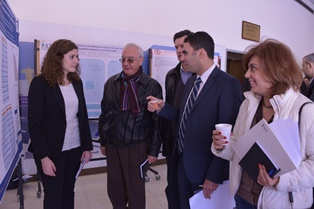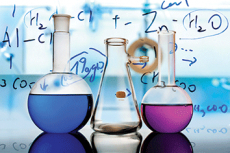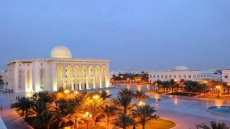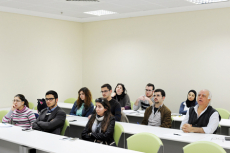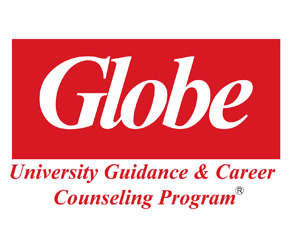2015 Biomedical Research Day shows graduate and post-graduate research to be thriving at AUB
Master’s and PhD students as well as postdocs presented the results of ongoing research projects addressing topics as diverse as developing virtual patients for medical school examinations, testing the anti-cancerous activity of plant extracts, nutrition and diet research, and bullying and other behavioral research.
When it first started in 2010, the Research Day received 30 abstracts. Today it has attracted almost three times this number, which speaks to the University’s strategic objective to grow its research and graduate programs.
The majority of projects submitted came from the Faculty of Medicine, but the faculties of Engineering and Architecture, Arts and Sciences, Health Sciences, and Agricultural and Food Sciences were all represented through the projects.
“The biomedical research day provides a forum for students to present their research to the AUB community and to showcase the depth and breadth of research that is being performed at AUB within the different faculties and most importantly to foster collaborations between different investigators from different faculties,” said Dr. Ayad Jaffa, the chairperson of the organizing committee. “The essence of the meeting is to instill the interdisciplinary approach to biomedical research.”
Two keynote speakers were invited to speak at the event.
Dr. Georges El Fakhri, who is the youngest professor of radiology at Harvard Medical School and the founding director of the Center for Advanced Medical Imaging Sciences (CAMIS) at Massachusetts General Hospital (MGH), and the co-director of the Division of Nuclear Medicine and Molecular Imaging, spoke on new advances in imaging.
An internationally recognized expert in quantitative medical imaging, Dr. El-Fakhri has published more than 130 peer-reviewed articles, and proceedings, as well as many book chapters.
Dr. Muhammad H. Zaman, the Howard Hughes Medical Institute Professor of Biomedical Engineering and International Health at Boston University, spoke on engineering health solutions for the developing world, which is one of his two main research interests – the other being developing tools to study tumor progression in vivo.
Technologies developed by Dr. Zaman are in various stages of implementation in several countries. In 2013, Scientific American listed one of them among the 10 technologies that will change the world. He has won numerous awards for his research and teaching.
Highlights from the presentations included several projects that showed promising results. These included projects that:
- studied a component of an edible plant to tap into its cancer-fighting activity
- studied the rising prevalence of autism among children in Lebanon
- gained greater understanding of breast cancer in Lebanon, where there are more cases among young women than in the West
- uncovered a potential direct link between vitamin D and immunity
- highlighted the financial barriers that prevent children from having regular dental check-ups
- underscored the need to vaccinate very young and very old populations against the bacteriastreptococcus pneumoniae in order to reduce mortality from this bacteria, which causes many diseases including pneumonia and meningitis
- uncovered a trend showing that prostate cancer is being detected at later stages in Lebanon, which might point to poorly executed screening programs
- highlighted the need for more studies on bullying among middle school-aged children, who are getting bullied at the rate of one in three students
- studied the ability of sumac extracts to protect cells from oxidative stress, by testing on fish; the result was enhanced viability of embryos
- Studied the anti-cancerous effect of phytoestrogens on breast and ovarian cancers
- uncovered a mild iodine deficiency among the majority of children in Lebanon, despite the availability of iodized table salt; iodine deficiency can impair growth and development
- highlighted physicians’ faulty beliefs that pharmaceutical companies’ marketing campaigns do not affect their prescription behavior
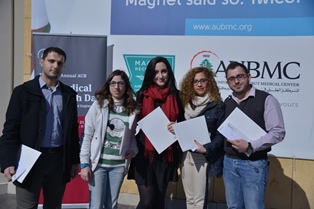 A jury composed of researchers and scholars from various departments studied the submissions and presentations in terms of scientific content, methodology, and presentation and defense of results.
A jury composed of researchers and scholars from various departments studied the submissions and presentations in terms of scientific content, methodology, and presentation and defense of results.
They announced the winners in the following categories:
• BIOMEDICAL: “Distribution of Area Fraction of Pores in Cortical Bone’s Pericortical and Intracortical Regions” by Ilige Hage, FEA
• CANCER: “Effect of Connexin 43 Loss on Polarity and Initiation of Tumorigenic Pathways in the Phenotypically Normal Breast Epithelium” by Dana Bazzoun, FAS
• CLINICAL I: “Efficacy of Adalimumab Stored in Plastic Vials at Four Degrees Celsius” by Maamoun Abdul Fattah and Sara Al Ghadban, FM
• CLINICAL II: “Phosphorus Supplementation Abolished Weight Loss of Rats Maintained on Low Protein Diet” by Rola Hammoud, FAFS
• OTHER: “Knock-out of the bradyzoite marker p18 in Toxoplasma gondii: insights towards a functional characterization during neurotoxoplasmosis” by Nadim Tawil, FM
Additionally The Farouk Jabre Award was presented to five faculty groups working in interdisciplinary research.
The Farouk Jabre Award is a one-year grant awarded to faculty from different backgrounds who identify a common area of interest and, using their different areas of knowledge, would collaborate on a research topic. The awardees for this year are:
• Dr.’s Firas Kobaissy and Hala Darwish from FM and Dr. Pierre Karam from FAS for their study, "Developing sensitive and specific biosensor for traumatic brain injury biomarkers"
• Dr. Diana Jaalouk from FAS and Dr.’s Marwan Refaat and Georges Nemer from FM for their study, “Insight into the deregulation of Hic-5 and Rbm20 in LaminA/C and emerin related cardiomyopathies.”
• Dr.’s Fadl Moukalled and Samir Alam from FM for their study, “The development of a novel low computational cost non-invasive direct method to predict ischemia in human diseased coronary arteries.”
• Dr. Rihab Nasr from FM and Dr. Rabih Talhouk from FAS for their study, “miRNA as Circulating Biomarkers for Breast.”
• Dr. Md Anwarul Hasan from FEA and Dr. Ayad Jaffa from FM for their study, “Development of a biomimetic blood vessel using multilayered composite nano-microfiber scaffolds for cardiovascular tissue engineering.”






